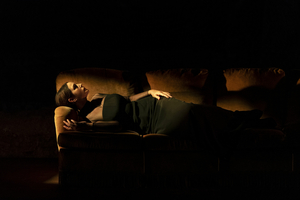Review: MARIA CALLAS: LETTERS & MEMOIRS, Her Majesty's Theatre
Monica Bellucci is Maria Callas in London for one night only, reading the opera singer's letters directed by Tom Volf.

![]() She charmed Daniel Craig's pants off in Spectre, was rather bored in the Matrix, and accompanied Christ to the cross in The Passion Of The Christ. A sex symbol in the 90s and noughties, now she is Maria Callas in her one-night-only West End debut. An icon plays an icon, both with colossal reputations they can't shake.
She charmed Daniel Craig's pants off in Spectre, was rather bored in the Matrix, and accompanied Christ to the cross in The Passion Of The Christ. A sex symbol in the 90s and noughties, now she is Maria Callas in her one-night-only West End debut. An icon plays an icon, both with colossal reputations they can't shake.
Directed by Tom Volf, the piece has been touring for a few years internationally. Callas becomes a sensitive, soft-spoken diva through Bellucci as we hear of her scandals, romances, affairs, and underlying grief through her letters.
She introduces the woman behind the controversial voice. From the troubled relationship with her mother and the psychological violence she used on her to her romantic disappointments, we discover a strong and driven artist. Her battles ranged from an ugly divorce - at a time when the concept was still foreign - to a ceaseless war against the press.
Depicted as a "tigress" and a temperamental prima donna, she comes off as a deeply wronged human being, used by the industry as well as her lovers. Volf gives La Divina a chance to settle the score with Letters and Memoirs, but the whole project - albeit striking - feels rather surface and might be slightly difficult to follow with no prior knowledge of Callas.
A sofa modelled on the singer's own and a gramophone are her only stage companions while projections fill the void. Volf has Callas's messages appear in her flourishing handwriting while Bellucci sits or stands or lies placidly downstage. She fills the room effortlessly, clothed in a dress owned by Callas herself, remaining imperious through sadness and pain.
The Italian star performs in English, her accent thick but flowing but for a few hiccups. The foreign inflection imparts more than a few odd pauses that break her sentences in curious places, but it's overall impressive (English is, after all, not Bellucci's first or even second language).
Enveloped by darkness and surrounded by roses on the Phantom's stage (how poetic to perform the words of a real-life opera singer on the same boards as a fictional one's), Bellucci looks as lonely as Callas felt. Mostly, we learn of the dedication to her artistry and her paranoia that nobody was supportive of her choices.
A few famous names appear as the addressees to her letters, like Grace Kelly and Pier Paolo Pasolini, while others become stable figures in Callas's life. She seeks the constant approval of Spanish soprano Elvira de Hidalgo, mentor and friend, while she shares indiscretions with writer, socialite, and prominent gossip columnist Elsa Maxwell.
Volf moves Bellucci very little and delicately, with warm but sharp spotlights locking her into place. Maria Callas: Letters & Memoirs is his latest venture to preserve the opera singer's legacy after an eponymous book, a film (Maria by Callas), and the Maria Callas Endowment Fund.
All in all, the piece is an excellent memorial of the diva, but feels a bit tight on the shoulders; it's difficult to paint an entire existence in an hour and twenty minutes. Bellucci is exquisite as she stands, statuesque, in a chignon, looking up from her eyelashes, but isn't too convincing in the long run. It's a vanity project, but a respectable one.
Reader Reviews
Videos

